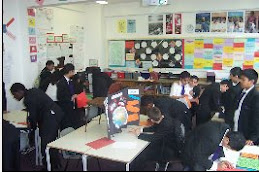 It's going to be 26 degrees in London today. I teach on a 5th floor classroom with south-facing windows, and no air conditioning. Even worse, we've had catches installed on the windows so they only open 4cm. Joy.
It's going to be 26 degrees in London today. I teach on a 5th floor classroom with south-facing windows, and no air conditioning. Even worse, we've had catches installed on the windows so they only open 4cm. Joy.So, here are my tips for dealing with the heat.
1. Get tissues. I dedicated an entire post to this matter here but seriously, kids get sweaty faces and they need to rub down as they come into the room. 2. Open windows early in the day. As soon as you get in, open windows and prop the door to ensure flow of air. Even if outside traffic noise is unbearabe you will have to be louder. I explain to students that today we deal with the noise in order to stay alive.
3. Water Bottles - Encourage students to bring water bottles to school and ask them to put them on their desk. My rule is that fluid must be see-through and not fizzy. If students get head-aches or hot, encourage them to keep drinking.
4. Use Settled Starters - During hot weather I have a starter sheet on the desk for each pupil at the beginning of every lesson. It should be something really simple, i.e. a wordsearch or cryptogram. Doing this will encourage them to sit down and concentrate - giving them time to cool down.
5. Turn computers off - If you have computers in your room, switch them off completely. They will be generating a surprising amount of heat that you can do without.
6. If you bend rules, be consistent and explanatory - At the beginning of the lesson state what the new rule is, why it is has changed and how long it will last. For example: "The rule is that you must wear your blazer in class. Today it is very hot so I will change this rule today only. You may take your blazer off and put it on the back of your chair. (wait for movement). Tomorrow I expect you to have blazers back on, unless I say otherwise."
This works because students appreciate you thinking about their comfort but they realise that hot weather does not mean classroom procedures suddenly go out the window.
7. Get outside in your breaks! Enjoy the weather while we have it.










 Finally, and this is my favourite bit, by clicking on the 'possible plagiarism' bit you get taken to a google page showing the websites. You are then able to present the sudent with the website that the text was taken from. It's also worth checking these as sometimes there are a LOT of hits with the same sentence - in this case, it's simply that the topic means a student is likely to write that combination of words. If there's only one hit returned, and it matches a lot of the work, then it's likely to be plagiarism.
Finally, and this is my favourite bit, by clicking on the 'possible plagiarism' bit you get taken to a google page showing the websites. You are then able to present the sudent with the website that the text was taken from. It's also worth checking these as sometimes there are a LOT of hits with the same sentence - in this case, it's simply that the topic means a student is likely to write that combination of words. If there's only one hit returned, and it matches a lot of the work, then it's likely to be plagiarism.








